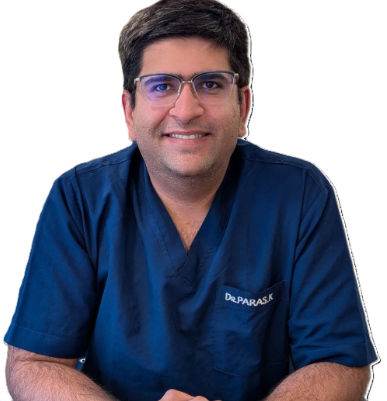What is the Recovery Time after Cataract Surgery?

Quick Summary
- Cataract surgery is a safe and effective procedure. It usually involves few complications and a smooth healing process.
- After cataract surgery, you can experience a better lifestyle with clear vision. However, you still need to give enough time for recovery and follow all postoperative instructions recommended by the doctor.
- The recovery time for cataract surgery varies from person to person, but it usually takes about 4-6 weeks for the vision to fully recover.
Table of Contents
Cataract surgery is a safe and effective procedure. While cataract surgery recovery time can vary from person to person, it usually involves few complications and a smooth healing process. By replacing the natural clouded lens with an artificial one, cataract surgery aims to restore vision without the risk of a cataract returning.
After cataract surgery, you can experience a better lifestyle with clear vision. However, you still need to give enough time for recovery and follow all postoperative instructions recommended by the doctor. But what is the appropriate cataract surgery recovery time? Continue reading the blog to know the recovery time and the things you must remember during the recovery of cataract surgery.Recovery Timeline After Cataract Surgery
As per research, approximately 9 out of 10 people have better vision after cataract surgery. However, everyone (and every eye) is different; therefore, the full cataract surgery recovery time can vary from person to person.
Mostly, people feel that their eye has stabilised and their vision restored four to six weeks after the cataract surgery. For others, complete recovery can take up to three months. The factors affecting cataract surgery recovery time include age, gender, other eye conditions, following post-operative instructions, etc.
The first few weeks of home care are vital to a quick recovery. You might witness clear vision as quickly as several hours after the surgery, and your eye will probably begin to feel better in one to two days. But you may still need to follow instructions from your provider to ensure complete recovery. Make sure to have someone ride you home after the surgery, as you cannot drive yourself.
The following is a general cataract surgery recovery timeline that you might experience after the operation:
1-3 days
During the first 24 to 48 hours after surgery, you will probably experience pain, grittiness, watering, blurred vision, double vision, or a red or bloodshot eye. Furthermore, you may have a sensation of having a foreign body in your eye. This can lead to itching. However, do not rub or scratch your eye.
A day after the surgery, your eye doctor will schedule an eye exam to ensure no complications. This will help the doctor evaluate your vision and determine the course of medication.
1-2 weeks
You will be able to see more clearly, no longer experience pain or itchiness, and have decreased inflammation. It is important to clean your eyes twice daily during the first two weeks of recovery. Why? Because the eye drops and the healing process can cause slight stickiness.
You will undergo a second eye exam one to two weeks after the surgery. If you still experience these issues at the time of the second eye exam, inform your optometrist immediately. During this visit, the optometrist will determine if you need to continue antibiotic eye drops. Moreover, they will reduce the use of steroid eye drops.
One month and more
By the end of the first month after surgery, your eye will return to normal with much clearer vision, though you might still have some blurry vision. Furthermore, you will no longer experience pain or inflammation and be able to perform moderate activities and exercises.
After the second visit, the optometrist may schedule one or two eye exams between four to eight weeks after the surgery. These eye examinations will help finalise medications and clear you for several other activities.


Things to do during Cataract Surgery Recovery
Cataract surgery takes approximately 15-20 minutes. After the operation, the doctor will provide homecare instructions to protect your eye during recovery. These measures can also help you minimise your cataract surgery recovery time. As you heal from the cataract surgery, make sure to do the following:
Use prescription eye drops as prescribed
After the procedure, your optometrist or surgeon will prescribe antibiotic eye drops to avoid infection and steroid eye drops for inflammation. To reduce the feeling of scratchiness (a common occurrence in the first few months after the cataract surgery), the doctor may prescribe lubricating eye drops for three to four months post-surgery.
Rest as needed
As with any other surgery, it is important to allow your body some time to recover after cataract surgery. You should avoid household work or strenuous activities for a few days after the procedure.
But how many days of rest are required after an eye operation? Taking one to three days off from work can help you get enough time to rest.
Protect your eyes from contamination
Your eye is more susceptible to injury and infection when it heals. Therefore, you should avoid any activity that can cause trauma to your eyes, such as playing contact sports or going outside on a windy day.
Furthermore, you should wear glasses or an eye shield at night and while washing your hair.
Wear a protective shield on your eye while sleeping
The doctor will provide you with a protective eye shield, eye patch, or an ocular bandage to avoid rubbing your eye or causing an injury to the eye while sleeping. Wear this protective shield for at least a week after the surgery. Additionally, if you are a side sleeper, sleep on the non-operative side to avoid applying pressure as the eye heals.
Take pain medications if needed
If you experience discomfort when you get home after the surgery, you can take a mild painkiller, such as paracetamol.
New Glass with changed power
The power of your pre-existing spectacles may not be right for you after the cataract surgery. Because the power of your operated eye changes after the procedure. The change in power also depends on the type of artificial lens used to replace the natural clouded lens.
Usually, the cataract operation recovery time is about one month, at the end of which the eye power in the operated eye stabilises. Therefore, new power for glasses is prescribed one month after cataract surgery.
Things not to do during Cataract Surgery Recovery
While recovering from cataract surgery, you should avoid the following activities until your doctor says otherwise:
- Driving for a few days
- Participating in strenuous activities and heavy lifting for two weeks
- Bending over or putting extra pressure on the eye immediately after the procedure
- Getting soap or water in your eyes during baths or showers
- Swimming and using hot tubs for four to six weeks
- Touching your eyes
- Wearing eye makeup for a week or two
- Use face creams and lotions
- Dusting or gardening
- Try not to sneeze or vomit
Foods to Eat and Avoid After Cataract Surgery
After undergoing surgery for a cataract, it is essential to eat nutritional supplements that help quick recovery and limit complications. The foods that you should include in your diet during cataract surgery recovery time include:
- Protein-rich foods (regenerate eye tissue): Seafood, beef, chicken, pork, milk, eggs, grains, etc.
- Foods rich in fat (reduce inflammation): Nuts, sunflower seeds, avocados, almonds, etc.
- Foods rich in Omega 3 (improve vision): Tuna, salmon, mackerel, etc.
- Starchy foods (provide energy and heal wounds): Whole grains, rice, legumes, oats, sweet potatoes, etc.
Foods that you must avoid after cataract surgery include:
- High-sugar foods (slows down the recovery process and wound healing): Soft drinks, cakes, chocolates, etc.
- Spicy foods (risk of recurrent cataracts): Chillies, peppers, and food containing many spices
When Can You Return to Work?
When Should You Call Your Eye Doctor?
Although cataract surgery is a safe procedure, it can sometimes cause side effects for which you should keep an eye out. Call your eye doctor if you experience the following:
- Signs of infection
- Increased redness or pain
- Increased light sensitivity
- Decreased vision
When complications arise, they need to be addressed immediately. Seek emergency medical attention if you experience the following symptoms:
- A dark curtain obstructing vision
- Sudden flashes of light
- Eye pain that does not improve with medicines
- Shadows in your peripheral vision
- Severe red eyes
- Vision loss
Takeaway
Most people who undergo cataract surgery experience an improvement in vision afterwards. It is a safe and effective procedure with a relatively short recovery time. As your eyes go through the recovery period after the operation, you should do everything that helps the process go smoothly.
While the cataract surgery recovery time varies from person to person, it usually takes four to six weeks for the eye’s tissues to stabilise. Follow your optometrist’s instructions to minimise your recovery time and reduce the risk of complications.
Consult our doctors at HexaHealth for any further doubts regarding manual cataract surgery or laser cataract surgery recovery time. Our team’s experts ensure extensive assistance throughout the procedure, from hospital admission to aftercare. Get proper guidance on the do’s and don’ts of cataract surgery recovery TODAY!Frequently Asked Questions
What is cataract surgery recovery time?
Can you walk immediately after cataract surgery?
How long does it take to get full vision after cataract surgery?
What are the do’s and don’ts after cataract surgery?
The do’s after cataract surgery include:
- Use eye drops as prescribed.
- Rest as needed.
- Wear glasses or an eye shield to protect your eyes from contamination.
- Wear an eye-protective shield while sleeping.
- Take pain medications if needed.
The don’ts after cataract surgery include:
- Do not drive for a few days
- Avoid strenuous activities and heavy lifting for a few weeks
- Avoid bending over or putting extra pressure on the eye immediately after the procedure
- Do not get soap or water in your eyes during baths or showers
- Do not swim or use hot tubs for four to six weeks
- Do not touch your eyes
- Avoid wearing eye makeup for a week or two
- Avoid using face creams and lotions
- Avoid dusting or gardening
- Do not sneeze or vomit
How many days of rest are required after an eye operation?
What happens one week after cataract surgery?
Should you have 20-20 vision after cataract surgery?
How far can you bend over after cataract surgery?
How long do you have to wear dark sunglasses after cataract surgery?
What are common restrictions after cataract surgery?
Some common restrictions during cataract surgery recovery include:
- Driving
- Engaging in strenuous activities and heavy lifting
- Bending over
- Getting soap or water in your eyes during baths or showers
- Swimming
- Touching your eyes
- Using face creams and lotions
- Dusting or gardening
- Sneezing or vomiting
Can I read and watch TV after cataract surgery?
Last Updated on: 24 January 2023
Reviewer

Dr. Aman Priya Khanna
MBBS, DNB General Surgery, FMAS, FIAGES, FALS Bariatric, MNAMS General Surgery
13 Years Experience
Dr Aman Priya Khanna is a highly experienced and National Board–Certified Laparoscopic, GI, and Bariatric Surgeon with over 13 years of clinical expertise.
He is widely regarded as one of the best bariatric surgeons in Ahmedabad, ...View More
Author

She is an accomplished new-age professional who has interviewed prominent personalities such as Bhaichung Bhutia, G. Sathiyan, Shashi Tharoor, etc. A content writer interested in health communication, graphic desi...View More
Expert Doctors (10)
NABH Accredited Hospitals (5)
Latest Health Articles
Related Treatments




























 Open In App
Open In App